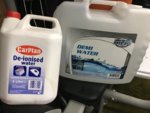Robmac
Full Member
- Messages
- 1,246
I've just been down to Halfords, hoping to buy some distilled water which I can't seem to find anywhere. Sadly Halfords didn't have any either.
They did however have Deionised water. Now I've always thought that this was unsuitable for batteries as it is acidic and some sort of additive had to be added before use, but the Halfords container clearly states for topping up batteries.
It may well be that they have put the additive in, which I presume is some sort of neutraliser, but it doesn't state that anywhere on the container.
I purchased it anyway, but haven't used it yet, if no good, Julie can have it for her iron or some other such useless object.
Any thoughts?
They did however have Deionised water. Now I've always thought that this was unsuitable for batteries as it is acidic and some sort of additive had to be added before use, but the Halfords container clearly states for topping up batteries.
It may well be that they have put the additive in, which I presume is some sort of neutraliser, but it doesn't state that anywhere on the container.
I purchased it anyway, but haven't used it yet, if no good, Julie can have it for her iron or some other such useless object.
Any thoughts?

